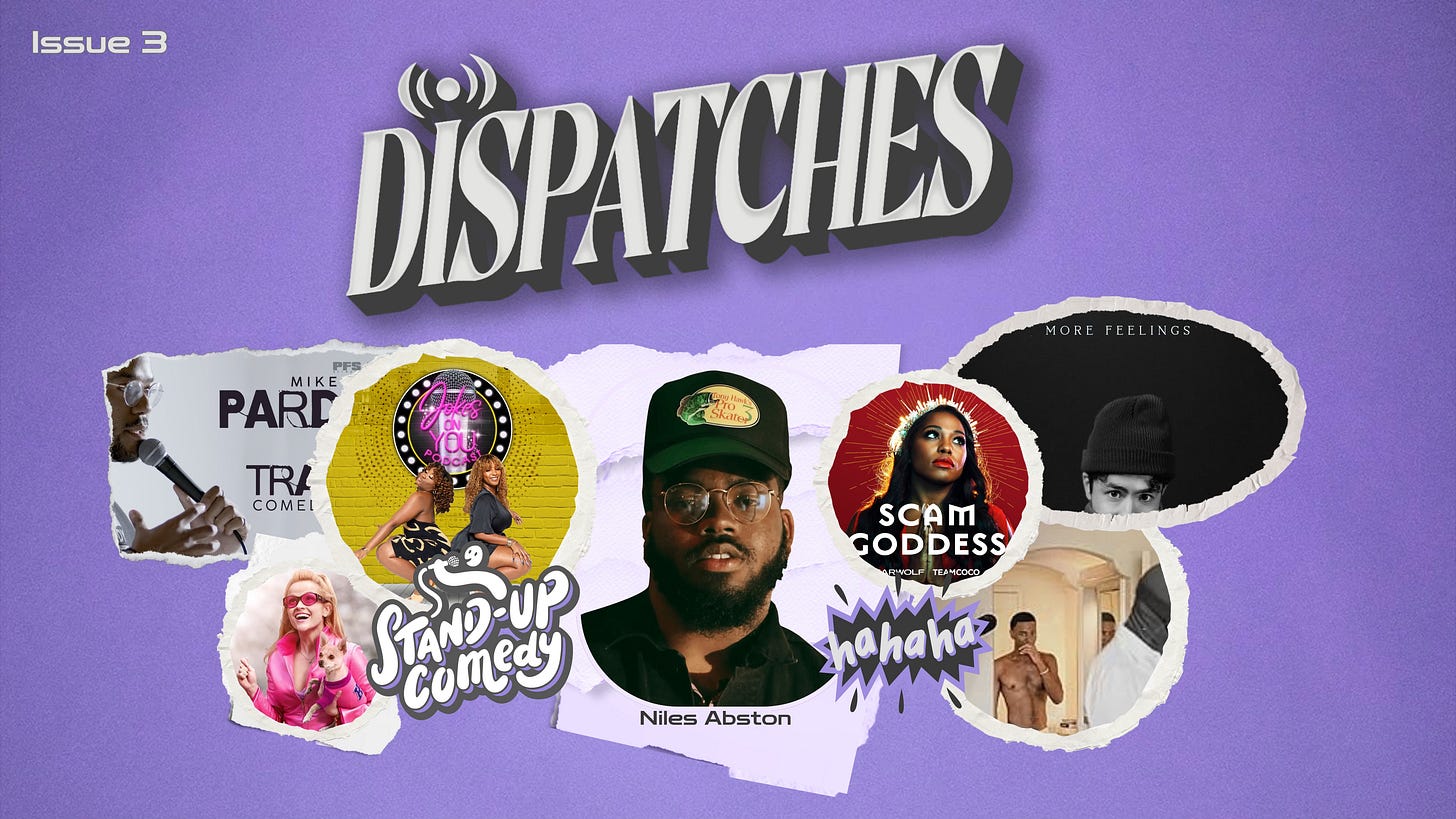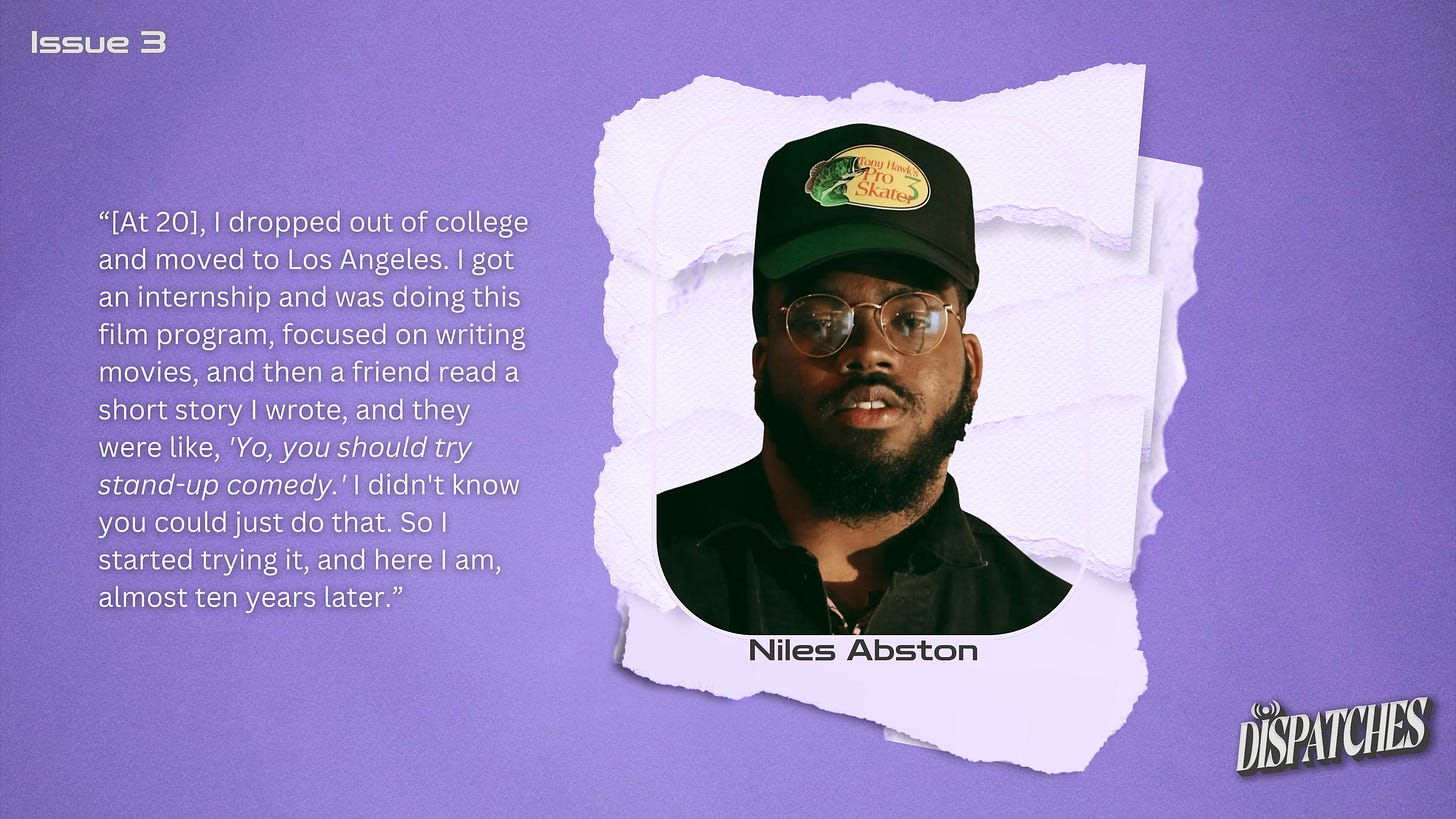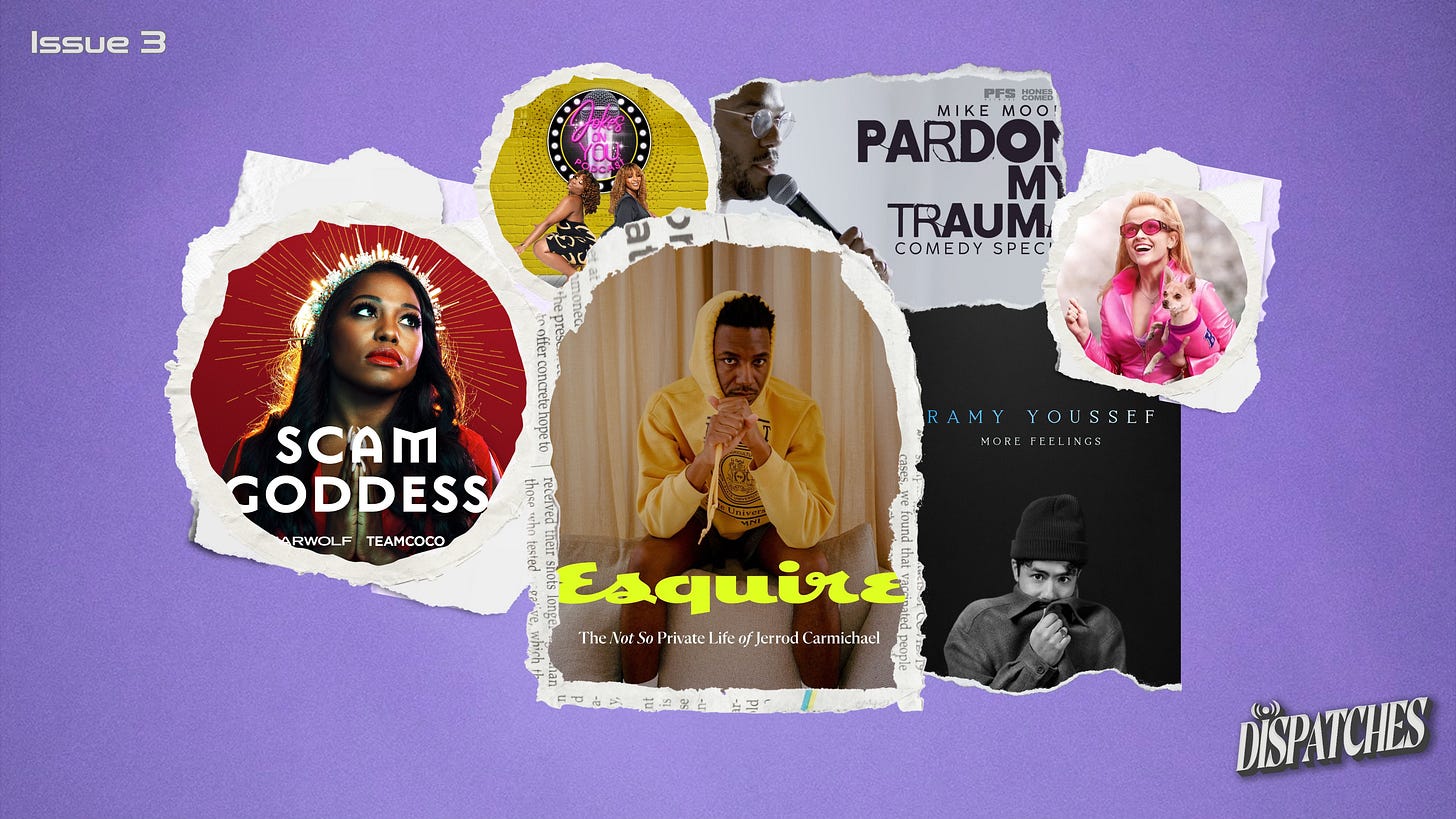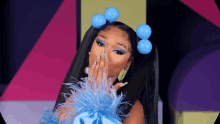Dispatches from Comedy & finding the laughter in the darkness || Issue #3
Niles Abston talks comedy, Ramy Youseff’s new stand-up special is a must see, & comedy media recs you’ll love! 😂🎭🎙️📺
Headliner
Hello babes! Lately, as I've been navigating my own turmoil and the stress of the world's dark realities, laughter has kept me going. I've been watching endless hours of sitcoms and stand-up specials and scrolling through my favorite comedians (such as Becca O'Neal, Jay Jurden, and Josh Johnson) social feeds for laughs. That laughter has been a lifeline for me. Truthfully, I've loved comedy all my life. But as of late, as many have tried to land a good trans joke but ultimately end up in a grandstanding pile of bigotry, I've been reconnecting with my love for comedy by finding the humor that respects my humanity.
This month at Dispatches, we're reporting live from the world of comedy as we celebrate April Fools All Month Long and focus on the glimpses of joy and humor in these dark times. Each issue this month will tackle some aspect of comedy with the goal of offering you a slice of happiness.
What I've been up to lately:
Well, babes, nothing to report on the me front … just yet. 🤭
According to the source
According to the Source, is a mini-interview section of Dispatches with an expert or professional in a respective field in the entertainment and broader media industry.
This week, I spoke with Niles Abston, 29, a comedian and screenwriter who has been pursuing his comedic dreams for almost a decade. His dedication to his craft has paid off, as he boasts successes such as writing credits for Dave, producing two stand-up specials, and more recently hitting the film circuit with his short film '98 Honda. In February, I was lucky enough to screen '98 Honda. Set in 2004, it follows a drug dealer tasked with babysitting his girlfriend's little cousin; shenanigans ensue as this unlikely duo tries to make it through the day. Check out our interview below about Abston's entry into comedy, his style of humor, the fears of pulling material from his personal life, his hopes for the future for Black comedians, and more.
What drew you to comedy and screenwriting? Was it something you always knew you wanted to do or a new career shift that ended up happening?
Abston: No, it's not something I always wanted to do. I know that as a kid, I liked movies, and I wanted to make them. But I never really made an effort to do that, or it was never a thing I pursued, considering being from Mississippi, and there's not a viable option to even do that. But I went to college and ran Division One track and field until I hurt my hip and had to get surgery at 19 years old. At that point, I didn't care much about school anymore because I'd never really liked school like that.
But I constantly had to do physical therapy for my hip, and in the training room, there would always be these classic funny movies that'll be on, on all the cable channels during the day for all the people that don't have jobs and shit. I would be watching them and be like, I think I can write better movies than this, which is a crazy thing to think at 20 years old. So, I dropped out of college and moved to Los Angeles. I got an internship and was doing this film program, focused on writing movies, and then a friend read a short story I wrote, and they were like, 'Yo, you should try stand-up comedy.' I didn't know you could just do that. So I started trying it, and here I am, almost ten years later.
Having seen your comedy specials and following your career thus far, you have a great sense of humor. What do you love most about being a comedian? How would you describe your style of humor?
Abston: I can say whatever the fuck I want. As long as it's funny. My style of humor is just authenticity first. I want to say how I feel and the truth every time. I try my best to find the funny in what I already want to say, and that way, it'll usually be something that'll connect with people, too.
What elements go into a standard stand-up routine for Niles Abston?
Abston: The elements are clear perspective, clear point of view, solid punch lines, and conversational delivery. When people watch my routine, I don't want them to feel like they're just getting jokes thrown at them. I want them to feel like they're having a conversation with me even though they're not talking. I want it to feel natural, so I don't necessarily write down my jokes. Instead, I come up with a topic or premise and then figure it out on stage. I never make jokes the same way every time. So that way, it doesn't feel too rehearsed.
Is it ever hard to pull from your life experience for a stand-up routine?
Abston: Yes. Somebody told me the other day they noticed that I don't have many jokes about my family and stuff, and I was like, 'Yeah because there are certain things I haven't healed from yet.' And I don't necessarily see the funny in it just yet. So I don't know how I'm going to talk about that.
I don't talk about relationships or dating a lot, and that's when I know I'll be a good comedian once I can finally talk about these things that hurt me. But some things are tough. I'm pretty good at this, but there are definitely some things that I haven't gotten to the point of seeing the humor yet and haven't been able to talk about.
Lastly, what are your hopes for future Black comedians and comedy writers like yourself in Hollywood?
Abston: I hope that those who do make it through the door and slip through the cracks can have some success. I hope that they reach back and open space for everyone else. Because some people will make it through on the independent route, or if they get supported by the industry, I hope they share resources and help others. Open the door because if we don't do it for each other, then who is? So that's what I hope for because when it happens, it will be like a Black comedy renaissance and make an impact. It's just somebody's gotta get through and not be selfish.
Media Library
What's a piece of media you have consumed lately? As the media literacy epidemic spreads across the digital world, I'm encouraging folks to get a diverse helping of a media diet by asking what they read, watched, or listened to lately while providing some links to recommendations of some of my favorite recent media.
Read
In the bubblegum nostalgia world of comedy, Legally Blonde is coming to a small screen near you, and Prime Video is developing the TV series. | Variety
Comedian Jerrod Carmichael dishes on crushing on his best friend Tyler the Creator, his sexuality, a new reality show on HBO, and the aftermath of holding Dave Chappelle (somewhat) accountable. | Esquire
Watch
Ramy Youssef: More Feelings is the latest special from the comic. It's a great watch any time of day, but I recommend a Friday night filled with his witty humor. | Where to Watch: Max
Pardon My Trauma is an independent stand-up special from Virginia native and Howard graduate Mike Moody. This special shows Moody finding the humor in his trauma as he heals through laughter. | Where to Watch: YouTube
On the reality TV side, comedian Jerrod Carmichael bares it all. In his new series, he sifts through his family trauma, analyzes his dating life, and what his reality looks like as a now openly gay Black man. Admittedly, I get secondhand embarrassment while watching but Carmichael puts the raw reality in reality TV. It's like a car crash you can't look away from. | Where to Watch: Max
Listen
Scam Goddess is a comedy podcast produced by the award-winning comedy network Earwolf and hosted by actor and comedian Laci Mosley. Each episode dives into the art of scamming and fraud with a comedic approach.
For those looking for a lighthearted and easy-listen comedy about trending topics, Jokes On You is a hilarious podcast hosted by the comedic duo Mel Mitchell and Talley.
Well, that's all, folks. This is Dispatches. I'm Daria Lynn Cottingham, and I'm signing off. ✍🏽💜





